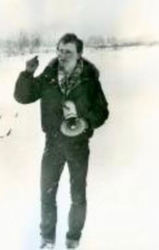Sergey Oksanine

Chers Lecteurs,
Mon père, Sergey Malakhov Oksanine, est décédé en mai 2024 dans sa maison dans le Sud de France.
Selon ses dernières volontés, moi Nataliya Malakhova, en tant que son unique enfant et héritière de ses droits d'auteur, continue à suivre l’échange avec ses lecteurs à propos de ses publications scientifiques et littéraires.
Mon adresse électronique de contact : nataliyamalakhova84@gmail.com
Mon père, Sergey Malakhov Oksanine, est décédé en mai 2024 dans sa maison dans le Sud de France.
Selon ses dernières volontés, moi Nataliya Malakhova, en tant que son unique enfant et héritière de ses droits d'auteur, continue à suivre l’échange avec ses lecteurs à propos de ses publications scientifiques et littéraires.
Mon adresse électronique de contact : nataliyamalakhova84@gmail.com
Ses oeuvres
5
oeuvres
-
HAMLET: a monologue on his way from the churchyard to the castle - Sergey Oksanine
Publié le 19/03/2021
The gap between the texts of Scene 1 and Scene 2 in Act V gives an idea that there has been a talk between Hamlet and Horatio on their way from the churchyard to the castle. While Hamlet, shocked by the death of Ophelia, is walking away alone from the cemetery, he is seen talking to himself about the Fortune. He realizes, that the wish of the “plume-armoured son” to verify the words of his father on the stage has finally led to Ophelia’s death. As Horatio approaches, they continue discussing this theme in the manner of scholasticism and cite both, New and Old Testaments. Finally, Horatio assumes that Hamlet, chosen by God, will outlive their times but for that, Elsinore’s master by birth will have to pay the price.
-
Jeu de Dés - Sergey Oksanine
Publié le 29/03/2021
Avant de retourner sur terre, les vaisseaux spatiaux restent en orbite pour être mis en quarantaine. Ils sont examinés par l'équipe sanitaire, qui décide de la durée pendant laquelle l'équipage restera en orbite. Mais cette fois, un vaisseau spatial, qui était absent depuis cent cinquante-six ans, est apparue sur l'orbite. La copie à distance habituelle des bases de données du vaisseau a été bloquée. Et ce n'était pas facile même y monter. Après « le trou de ver », où le vaisseau eut tombé, le principe d'optimalité stabilisa les systèmes de vie à bord d'un vaisseau spatial. L'apparition d'un nouvel être vivant provoque la mort d'un autre. Et les passagers commencent à récupérer les conditions physiques perdues – l’appendicite, la virginité. Parmi les passagers est l'auteur de la théorie de l'optimalité, qui crée sans le savoir un triangle amoureux dramatique entre lui-même, Miss Century d'une époque révolue et le Quarantänemeister, protagoniste de cette histoire.
-
Shakespearean Grammar in Hamlet’s monologue on his way from the churchyard - Sergey Oksanine
Publié le 19/03/2021
The Monologue is published in two versions – the Forum version (Shakespeare Discussion Group at online-literature.com) and the Journal version (International Journal of ELT, Linguistics and Comparative Literature, Vol.8. Issue 3. 2020 May-June). The Journal version is completed by some remarks on Shakespearean Grammer. But the interest to the Monologue needs more attention to the pecularities of Elizabethan English used in the text.
-
Wake Up, Ares - Sergey Oksanine
Publié le 19/03/2021
This is the story of eternal love between Ares, the god of war, and Aphrodite, his wife, the goddess of beauty. The play tells us only a part of their story, taking place in August 1962 in New York when Ares no longer wants to fight, because men invented the bomb and they don't need his art. Reading this play, not only will you find out how Michelangelo and Botticelli really worked on their masterpieces and who congratulated Louis XIV on his twentieth anniversary. The memories of play's characters will also make you discover why Pompeii was buried by the eruption of Vesuvius; why Rome fell under Germanic invasions and who really started the Trojan War. Through this play, you'll understand why the Caribbean crises didn't end in a war, how Marilyn Monroe died, and why Erich Segal wrote his Love Story.
- Le Sunn-Thrâa - Jean louis BOURDON
- Claire Mornelaime, la Nature dévoilée, par Anaïs Aubrande & le Canard Mécanique - Les Presses du Radeau
- Claire Mornelaime, une fée comme les autres, par Anaïs Aubrande & le Canard Mécanique - Les Presses du Radeau
- Claire Mornelaime, une sorcière comme les autres (édition révisée), par Anaïs Aubrande & le Canard Mécanique - Les Presses du Radeau
- La compétition, ce fléau - Bruno SCOAZEC
- Personnalité catholique du Troisième Reich - Didier DELANNAY
- ARTISTES du TROISIEME REICH - Didier DELANNAY
- La Récréation des Oiseaux - conte de Saint-Valentin, ni pour ni contre, bien au contraire, par le "scribe" Elisée Mérange - Les Presses du Radeau
- Mon Carême avec Sainte Thérèse de Lisieux - Anonyme
- LES MEMES PERSONNAGES/RDC - Anonyme











